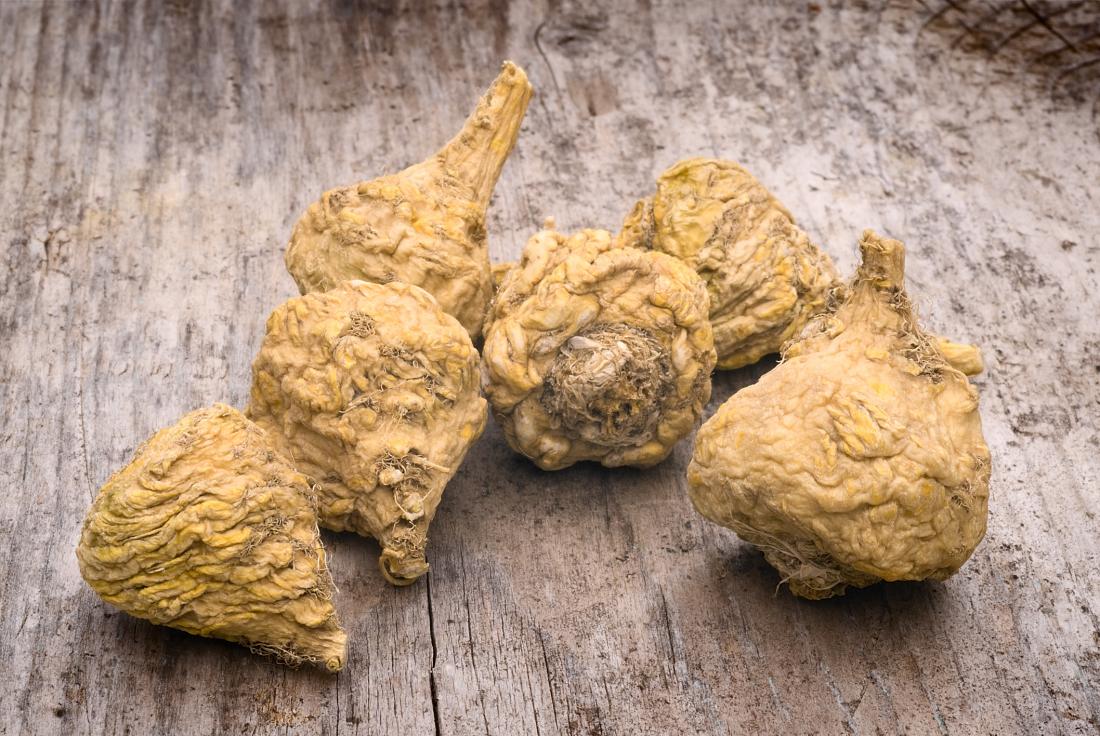What Is Maca?
While you’re unlikely to come across maca in the produce section of your grocery store, Pooja Amy Shah, M.D., a New York-based integrative and functional medicine physician and assistant professor at Columbia University, says maca is a cruciferous root vegetable—a relative of turnips and radishes. “It’s also often called Peruvian ginseng, but it’s not related to Asian or American ginseng at all; it’s a completely different plant,” she says. Maca root, she adds, comes in a variety of colors—including red, black, yellow and brown—and is traditionally grown in Peru.

“It looks like a big radish and is a hearty plant that can grow in harsh, extreme conditions,” says integrative medicine doctor Karen Koffler, M.D., from Coral Gables, Florida. “You have to appreciate a plant that can withstand harsh conditions—it’s an indicator of how it can help us when consumed.”
In Peru, maca is traditionally consumed in food and as a tea, explains Dr. Koffler. But here in the U.S., it’s more likely found as a powder, capsule or tincture. However you consume maca, your body can benefit in many ways.
7 Science-Backed Benefits of Maca Root
1. Helps the Body Manage Stress
Maca is an adaptogenic herb, and something all adaptogens have in common is that they can help the body manage environmental stress, explains Dr. Shah. “Adaptogens have long been used in Ayurvedic and traditional Chinese medicine, but they’re experiencing a renaissance [in the West],” she says.
What adaptogens may do (maca included) is help stimulate the body’s stress protection system by balancing the body’s hypothalamic pituitary adrenal (HPA) axis, according to Dr. Shah. The HPA axis is responsible for how the central nervous system and hormone systems respond to stress. When we feel stressed, cortisol levels go up. But scientific studies on rats show consuming maca can help keep cortisol levels from rising[1].
2. May Help With Depression
A 2014 study of mice found a link between consuming maca for six weeks and increased dopamine levels, leading to reduced feelings of depression. Registered naturopathic doctor Cassie Wilder, N.D., says this connection is likely due to maca’s adaptogenic nature. “When people are more resilient to stress and are better able to handle day-to-day stressors, their mood gets better,” she says. So if you’re constantly feeling like you’re “on edge,” regularly consuming maca could potentially help—although more human studies need to be done to confirm the connection between maca and mood.
3. May Lead to Increased Energy
One common reason people consume maca is for a caffeine-free energy boost. “While scientific studies haven’t been able to show exactly how maca boosts energy in the body, it does seem to have energy-producing effects in some people,” says Dr. Koffler.
While more scientific studies need to be conducted to confirm this connection, a small study of 175 people indicates a connection between maca and energy. In the study, people who took 3 grams of maca for 12 weeks reported experiencing more of an energy boost than people who didn’t consume maca. Because of this response, if you’re sensitive to herbs, it’s best to consume maca earlier in the day.
There are likely a few different reasons as to why we don’t know exactly how maca affects energy levels in the body, says integrative medicine doctor Siri Chand Khalsa, M.D. “There is so much that’s connected to how energized we feel; it’s not just one thing,” she says, adding that it’s very difficult to pinpoint one herb to energy since so many other lifestyle factors also play a role.
4. May Help With Symptoms of Perimenopause and Menopause
Dr. Wilder recommends maca most often to women in perimenopause or menopause. “What scientific literature shows is that maca supports the body during this stage of life without changing estrogen levels,” she says.
While more research is needed, a small study found menopausal women who consumed maca experienced fewer hot flashes and night sweats than they did when not consuming it.
5. Benefits Your Bones
The same study that showed a connection between maca and reduced menopause symptoms also revealed that participants had increased bone density after consuming maca. Another study—this one in rats—also found a connection between maca and strong bones. In the paper, the study authors say it’s likely because maca contains polyunsaturated fatty acids, a nutrient important for bone health.
“Maca helps make bones harder,” explains Dr. Wilder, adding that this trait is particularly noteworthy because women lose bone density as they age. “This is not to say that maca can be consumed in place of vitamin D or calcium—which are crucial for bone health—but there is still a connection there.”
6. May Boost Libido
All four experts say boosting libido is one of maca’s most well-known properties, a connection established by numerous scientific studies. “Maca has been said to have aphrodisiac properties and, again, this is without changing hormone levels,” says Dr. Wilder, adding that this response could be related to maca’s link to lowering stress, helping with mood and a subtle energy boost.
7. May Help With Male Fertility
Here’s a maca benefit specifically for men: Dr. Koffler says consuming maca is connected to producing a higher sperm count. “Men are constantly producing new sperm, so this is particularly noteworthy in terms of fertility,” she says. Adding to this importance is the fact that infertility cases stem just as much from male infertility issues as they do from women infertility issues.
How Do You Take Maca Root?
Clearly, maca has many impressive benefits. In the U.S., maca is typically ground up and sold as a powder or in a capsule or made into a tincture. Any time you buy a supplement, it’s important to research where it’s sourced from and if it was tested for toxins, notes Dr. Khalsa. She personally uses Consumer Lab, an independent third-party testing service, to research maca supplements for authenticity and toxicity.
In terms of dosage, up to 3 grams a day is considered safe when taken for up to four months, according to the National Library of Medicine. “In terms of knowing if the maca is ‘working’ or not, I advise consuming it for six to 16 weeks to see if you really notice a difference,” says Dr. Khalsa.
If you purchase maca in a powder, it can be added to food or drinks. “In Peru, maca has traditionally been incorporated into bread and other foods,” says Dr. Khalsa. She adds that some other popular ways of consuming maca are incorporating it into sweet baked goods (like brownies), juices, smoothies and soups.
Maca can be energy-boosting, so Dr. Khalsa recommends consuming it earlier in the day if you’re sensitive to herbs or tend to have trouble sleeping.
Source : forbes.com/health/body/maca-root-benefits/

